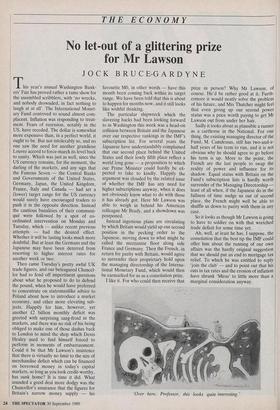THE ECONOMY
No let-out of a glittering prize for Mr Lawson
JOCK BRUCE-GARDYNE
This year's annual Washington Bank- ers' Fair has proved rather a tame show for the assembled scribblers, with 'no wrecks, and nobody drownded, in fact nothing to laugh at at all'. The International Monet- ary Fund contrived to sound almost com- placent. Inflation was responding to treat- ment. Fears of recession, notably in the US, have receded. The dollar is somewhat more expensive than, in a perfect world, it ought to be. But not intolerably so, and no one saw the need for another grandiose Louvre accord to force-march its level back to sanity. Which was just as well, since the US currency remains, for the moment, the darling of the markets, and any sign that the Famous Seven — the Central Banks and Governments of the United States, Germany, Japan, the United Kingdom, France, Italy and Canada — had set a (lower) target range for the US currency would surely have encouraged traders to push it in the opposite direction. Instead the cautious banalities of their communi- qué were followed by a spot of co- ordinated intervention on Monday and Tuesday, which — unlike recent previous attempts — had the desired effect. Whether it will be lasting looks much more doubtful. But at least the Germans and the Japanese may have been deterred from resorting to higher interest rates for another week or two.
Then came Tuesday's pretty awful UK trade figures, and our beleagured Chancel- lor had to fend off impertinent questions about what he proposed to do to defend the pound, when he would have preferred to concentrate on statesmanlike advice to Poland about how to introduce a market economy, and other more elevating sub- jects. Happily for him, however, yet another £2 billion monthly deficit was greeted with surprising sang-froid in the markets, and there was no risk of his being obliged to make one of those dashes back to London to mind the shop which Denis Healey used to find himself forced to perform in moments of embarrassment. Could it be that Mr Lawson's insistence that there is virtually no limit to the size of merchandise deficit which can be financed on borrowed money in today's capital markets, so long as you look credit-worthy, has sunk home? It is time it did. What sounded a good deal more dodgy was the Chancellor's assurance that the figures for Britain's narrow money supply — his favourite MO, in other words — have this month been coming back within its target range. We have been told that this is about to happen for months now, and it still looks like wishful thinking.
The particular shipwreck which the slavering hacks had been looking forward to in Washington this week was a head-on collision between Britain and the Japanese over our respective rankings in the IMF's subscription list. For several years the Japanese have understandably complained that our second place behind the United States and their lowly fifth place reflect a world long gone — a proposition to which our Prime Minister could hardly be ex- pected to take to kindly. Happily the argument was clouded by the related issue of whether the IMF has any need for higher subscriptions anyway, when it does not obviously know what to do with those it has already got. Here Mr Lawson was able to weigh in behind his American colleague Mr Brady, and a showdown was postponed.
Instead ingenious plans are circulating by which Britain would yield up our second position in the pecking order to the Japanese, moving down to what might be called the mezzanine floor along side France and Germany. Then the French, in return for parity with Britain, would agree to surrender their proprietary hold upon the managing directorship of the Interna- tional Monetary Fund, which would then be earmarked for us as a consolation prize.
I like it. For who could then receive that prize in person? Why Mr Lawson, of course. He'd be rather good at it. Furth- ermore it would neatly solve the problem of his future, and Mrs Thatcher might feel that even giving up our second power status was a price worth paying to get Mr Lawson out from under her hair.
Sadly it looks about as plausible a runner as a carthorse in the National. For one thing, the existing managing director of the Fund, M. Camdessus, still has two-and-a- half years of his term to run, and it is not obvious why he should agree to go before his term is up. More to the point, the French are the last people to swap the reality of power and influence for its shadow. Equal status with Britain on the Fund's subscription lists is hardly worth surrender of the Managing Directorship least of all when, if the Japanese do in the fullness of time nudge us out of second place, the French might well be able to shuffle us down to parity with them in any case.
So it looks as though Mr Lawson is going to have to soldier on with that wretched trade deficit for some time yet.
Ah, well, at least he has, I suppose, the consolation that the best tip the IMF could offer him about the running of our own affairs was the hardly original suggestion that we should put an end to mortgage tax relief. To which he was entitled to reply `join the club' — and to point out that his cuts in tax rates and the erosion of inflation have shrunk `Miras' to little more than a marginal consideration anyway.
`Over here, Professor, this looks quite interesting.'


























































 Previous page
Previous page